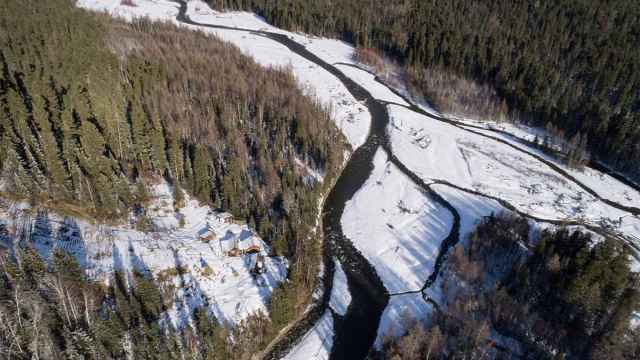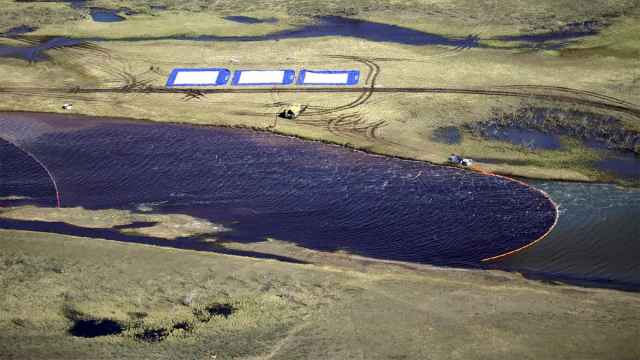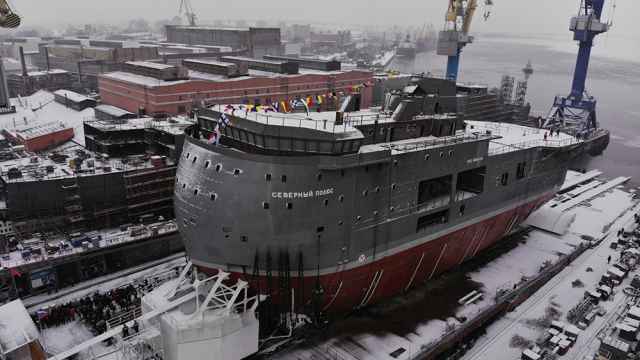Researchers from the Russian Hydrometeorological Institute, Roshydromet, had to flee from their Arctic station on Monday when the ice floe they were working on started to vanish from under their feet.
The scientists, who are studying pollution in Russia’s Arctic region, had been on the ice for more than a month when the emergency struck and they had to pack up their equipment and evacuate. The whole process took less than three hours, the camp organizers say.
A helicopter lifted the equipment, which included a meteorological laboratory and a shed, from the ice onto nearby icebreaking research vessel the Akademik Tryoshnikov.

The break-up of the ice had been anticipated. The researchers had seen growing cracks over the preceding days and guards were on 24-hour watch.
The expedition is part of Transarktika-2019, a major billion-ruble government-funded project on monitoring pollution in the Arctic. A key part of the project is the expedition with the Akademik Tryoshnikov.
The ship had set out from Murmansk on the March 20, and four days later made it to the Arctic ice of Franz Josef Land. The vessel has subsequently frozen into the ice and drifted with the current.
The ship and the researchers will now proceed further north to find a new ice floe to work on.
Transarktika-2019 was prompted by unprecedented climate change in the Russian Arctic. In some parts of the region average temperatures have increased by up to five degrees Celsius in less than 30 years.

Russia has a long tradition of organizing research expeditions on drifting Arctic ice. However, over the last few years, it has become increasingly difficult to find ice floes solid enough to hold the research stations.
The last big ice station, the North Pole-40, was established in October 2012, and had to be evacuated in May 2013, because the ice floe the base was placed on started to break apart. The 16 scientists that had spent the winter at the had to be rescued by a nuclear-powered icebreaker sent from Murmansk.
Russia did not set up any floating stations in 2013-2014 or in 2014-2015. In April 2015 it established a station called North Pole 2015, that only existed for four months.
In future, Russia will organize its drifting Arctic stations only from vessels. In December 2018, ship builders at the Admiralty Yard in St.Petersburg officially started construction of the North Pole station. The 84-meter long, 22.5 meter wide platform will be the world’s first research station permanently based in high Arctic waters.
For periods of up to two years at a time, the North Pole will drift across the Arctic with a crew of 14 and teams of up to 34 researchers.
The vessel will be completed in 2020.
A Message from The Moscow Times:
Dear readers,
We are facing unprecedented challenges. Russia's Prosecutor General's Office has designated The Moscow Times as an "undesirable" organization, criminalizing our work and putting our staff at risk of prosecution. This follows our earlier unjust labeling as a "foreign agent."
These actions are direct attempts to silence independent journalism in Russia. The authorities claim our work "discredits the decisions of the Russian leadership." We see things differently: we strive to provide accurate, unbiased reporting on Russia.
We, the journalists of The Moscow Times, refuse to be silenced. But to continue our work, we need your help.
Your support, no matter how small, makes a world of difference. If you can, please support us monthly starting from just $2. It's quick to set up, and every contribution makes a significant impact.
By supporting The Moscow Times, you're defending open, independent journalism in the face of repression. Thank you for standing with us.
Remind me later.






